Sawmills eTool
Lumber Storage » Lumber Handling Vehicles
-
>> Lumber Handling Vehicles
Lumber-handling vehicles include all mobile equipment normally used in sawmill, planing mill, storage, shipping, and yard operations. 1910.265(c)(30)(i)
Lumber Handling
Hazard/Solutions
Lumber-handling vehicles may collide with nearby objects or other workers if proper safety measures are not in place.
-
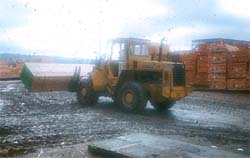
Powered industrial truck with finished lumber All vehicles must be equipped with audible warning signals and have spark arrestors where usable. 1910.265(c)(30)(ii)
-
All vehicles operated in the dark or in poorly lighted areas must be equipped with head and tail lights. 1910.265(c)(30)(iii)
-
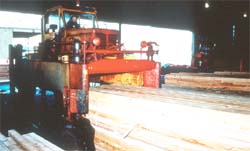
Straddle carrier truck used for moving lumber All vehicles must be equipped with brakes capable of holding and controlling the vehicle and capacity load upon any incline or grade over which they may operate. 1910.265(c)(30)(ix)
-
Carriers need to be designed and constructed so that the operator's field of vision is not unnecessarily restricted. 1910.265(c)(30)(xi)(a)
Workers may suffer injuries during operation or while entering or exiting the vehicle if proper safeguards are not in place.
-
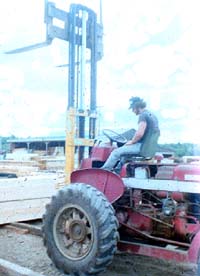
Powered industrial truck. Note the lack of an overhead guard for the operator. All vehicles operated in areas where overhead hazards exist must be equipped with an approved overhead guard. 1910.265(c)(30)(iv)
-
Where the operator is exposed to hazard from backing the vehicle into objects, an approved platform guard must be provided that does not hinder the exit of driver from the vehicle. 1910.265(c)(30)(v)
-

Straddle carrier Vehicles powered by internal combustion engines may not operate in buildings unless the buildings are adequately ventilated. 1910.265(c)(30)(vii)
-
Provide carriers with an access ladder or equivalent. 1910.265(c)(30)(xi)(b)
Workers may be struck or crushed by logs or lumber due to unintentional movements of the load.
-
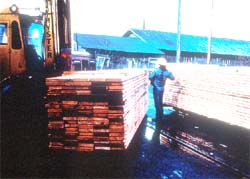
Worker is too close to moving equipment and lumber. On trucks where movement of load on stopping would endanger the operator, a substantial bulkhead must be installed behind the operator's seat. This needs to extend to the top of the operator's compartment. 1910.265(c)(30)(xii)(a)
-
Stakes, stake pockets, racks, tighteners, and binders must provide adequate means to secure the load against any movement during transit. 1910.265(c)(30)(xii)(b)
-
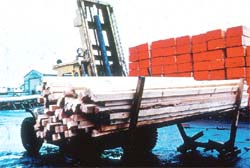
A powered industrial truck moves lumber. Where rollers are used, at least two need to be equipped with locks that are locked when supporting loads during transit. 1910.265(c)(30)(xii)(c)
-
No vehicle may be operated with loads exceeding its safe load capacity. 1910.265(c)(30)(viii)
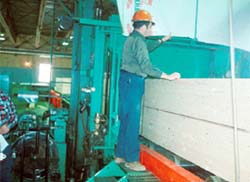
-
Loads must be built and secured to insure stability in transit. 1910.265(c)(28)

